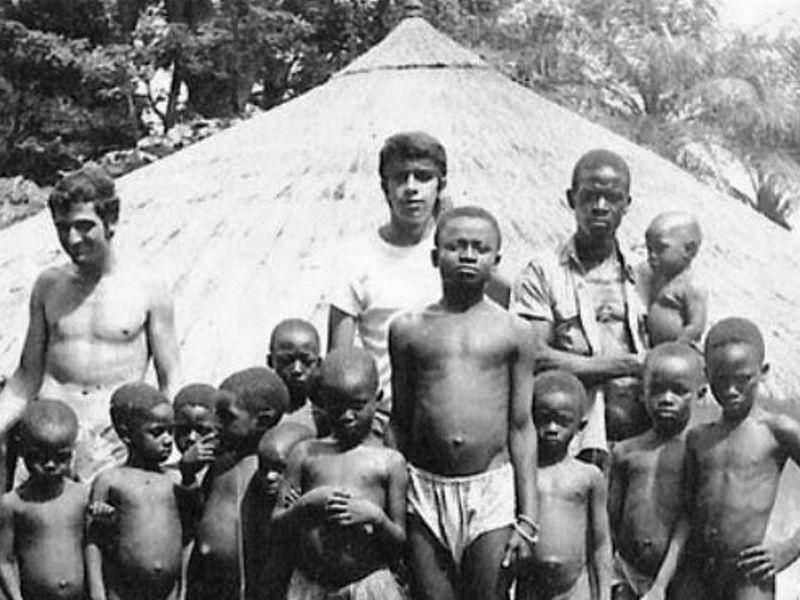
Angolan History: Independence Movement and Colonial War (1950s-75)

Figure 1.--The photo was taken in Sanzala, Angola, during the early 1970s. It shows two Portuguese soldiers with local children. At the time Portugal was engaged in colonial wars against the independence movements. That became a source of poverty for these African colonized peoples, but also harmed the Portuguese economy, diverting scarse resources for the war instead of being used for the education and other needed social programs. The colonial wars of 1960s-70s were not 'the cause' of Portuguese poverty, but in a very poor country like Portugal those wars were another element of impoverishment, both for Portugal and its African colonies. One interesting aspect of the Portuguese colonial experuiebce is tha we see a dehree of closeness as well a level of social mixing that we do not see in the British and French colonies.
|
|
Descrimination against the indigenous Angolan population as well as mestišos fueled the independence movement which developed after World War II. African and mestišo-led associations with increasingly political goals began to appear in Angola (1950s). Portuguese autorities attempted to supress them. Leaders were arrested and jailed or exiled. This drove the political movement underground and toward increasingly radical goals. These groups becaming increasingly well organized to begin a serious campaign for indepedence (1960s). The independence movement was, however, fragmented along ethnic/tribal lines. Personal animosities also complicated the situation. The independence movement was strongest among the mestišo and African population in the growing cities where the population had some minimal education and was more politicized. The African rural population was increasingly alienasted during the 1960s because of not only economic decline, but Portuguese policies which included land seizures and forced labor. The independence groups were thus able to recruit adherents in the countryside. The result was a series of violent events in urban and rural areas that marked the beginning of a long and often ineffective armed struggle for independence. Portugal attempted to use military means to continue colonial control. The Portuguese army, tiring continued warfare in Angola amd Mozambique overthrew the Portuguese government (1974). The revolution in Portugal dramatically changed the political situation both in Portugal and its colonies. The new Communist regime which took power in Portugal decided to leave Angola to its own devices. They withdrew from Angola, leaving the colony's future to the three major anti-colonial movements, none ofcwhich were prepared for responsible government or ciommitted to democracy. After nearly five centuries of Portuguese influence and colonization, Angola finally achieved independence.
HBC

Navigate the Boys' Historical Clothing Web Site:
[Return to the Main Angolan history page]
[Return to the Main African history page]
[Introduction]
[Activities]
[Biographies]
[Chronology]
[Cloth and textiles]
[Clothing styles]
[Countries]
[Topics]
[Bibliographies]
[Contributions]
[FAQs]
[Glossaries]
[Images]
[Links]
[Registration]
[Tools]
[Boys' Clothing Home]
Navigate the Boys' Historical Clothing national pages:
[Return to the Main Angolan page]
[Return to the Main African page]
[Cape Verde Islands]
[Democratic Republic of the Congo]
[Gabon]
[Lessotho]
[Madagascar]
[Mali]
]South Africa]
[Uganda]
[Portugal]
Created: 1:12 PM 11/6/2012
Last updated: 1:12 PM 11/6/2012



